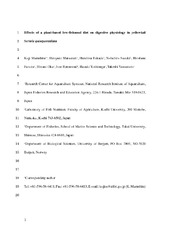| dc.contributor.author | Murashita, Koji | |
| dc.contributor.author | Matsunari, Hiroyuki | |
| dc.contributor.author | Fukada, Haruhisa | |
| dc.contributor.author | Suzuki, Nobuhiro | |
| dc.contributor.author | Furuita, Hirofumi | |
| dc.contributor.author | Oku, Hiromi | |
| dc.contributor.author | Rønnestad, Ivar | |
| dc.contributor.author | Yoshinaga, Hazuki | |
| dc.contributor.author | Yamamoto, Takeshi | |
| dc.date.accessioned | 2020-06-19T09:50:02Z | |
| dc.date.available | 2020-06-19T09:50:02Z | |
| dc.date.issued | 2019 | |
| dc.Published | Murashita K, Matsunari H, Fukada H, Suzuki, Furuita H, Oku H, Rønnestad I, Yoshinaga, Yamamoto T. Effect of a plant-based low-fishmeal diet on digestive physiology in yellowtail Seriola quinqueradiata. Aquaculture. 2019;506:168-180 | eng |
| dc.identifier.issn | 1873-5622 | en_US |
| dc.identifier.issn | 0044-8486 | en_US |
| dc.identifier.uri | https://hdl.handle.net/1956/22767 | |
| dc.description.abstract | To characterize the effects of a plant-based low-fishmeal (LFM) diet on the digestive physiology of yellowtail, Seriola quinqueradiata, we prepared two isonitrogenous and isolipidic diets; an FM-based diet (diet Control, FM 50%) and a plant protein (soybean meal and corn gluten meal)-based low fishmeal diet (diet LFM, FM 15%), and examined the acute and chronic effects of the diets on the digestive physiology of the fish were examined. In the acute effect trial (fed only a single meal), the fish fed the LFM diet displayed faster gastric emptying, lower pH of the gastrointestinal content and suppressed pancreatic digestive enzymes (trypsin, chymotrypsin and amylase) secretions. In the chronic effect trial (feeding for six weeks), in addition to the effects observed in the acute trial, the fish fed the LFM diet also displayed suppressed stomach pepsin secretion and pancreatic digestive enzymes production (gene expression). Furthermore, gene expression levels of digestion-regulating hormones, gastrin, cholecystokinin and peptide yy were also disrupted by the long-term administration of the LFM diet. Taken together, these results indicate that a plant protein-based low fish meal diet appears to not fully activate or stimulate the digestive system of yellowtail in either the short or long term and that its inhibitory/disruptive effects become more pronounced on a long-term basis. The effects we have identified on yellowtail digestive physiology could serve as important indicators to improve the plant-based low-fishmeal diets. | en_US |
| dc.language.iso | eng | eng |
| dc.publisher | Elsevier | en_US |
| dc.rights | Attribution-NonCommercial-NoDerivs CC BY-NC-ND | eng |
| dc.rights.uri | http://creativecommons.org/licenses/by-nc-nd/4.0/ | eng |
| dc.title | Effect of a plant-based low-fishmeal diet on digestive physiology in yellowtail Seriola quinqueradiata | en_US |
| dc.type | Peer reviewed | |
| dc.type | Journal article | |
| dc.date.updated | 2019-11-15T09:56:51Z | |
| dc.description.version | acceptedVersion | en_US |
| dc.rights.holder | Copyright 2019 Elsevier | en_US |
| dc.identifier.doi | https://doi.org/10.1016/j.aquaculture.2019.03.040 | |
| dc.identifier.cristin | 1712311 | |
| dc.source.journal | Aquaculture | |
| dc.source.pagenumber | 168-180 | |
| dc.relation.project | Norges forskningsråd: 261753 | |
| dc.identifier.citation | Aquaculture. 2019;506:168-180 | |
| dc.source.volume | 506 | |

